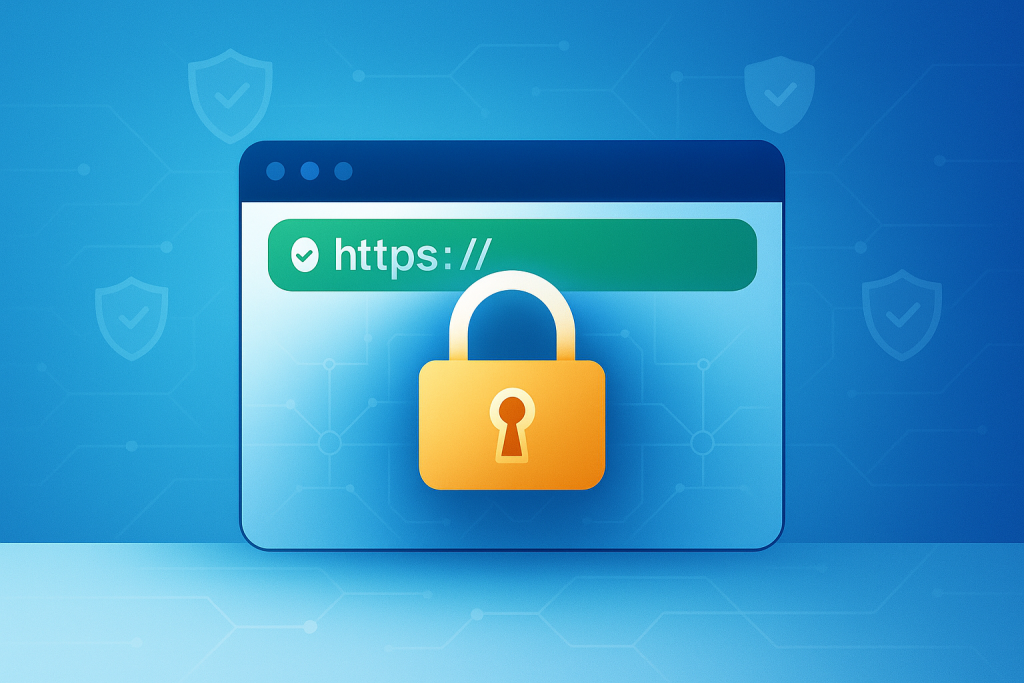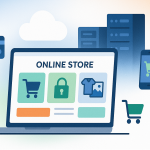Less than a decade ago, the green padlock in your web browser was a novelty—a badge of honor reserved for massive e-commerce stores and banks. Today, that padlock is the absolute baseline of internet trust.
If your website, whether it’s a hobby blog, a local bakery’s brochure site, or a growing e-commerce shop, is still using the old HTTP protocol, you are actively driving away customers, hurting your search rankings, and exposing your visitors to unnecessary risk.
In 2025, website security is not an optional feature; it is the fundamental currency of credibility. Every major browser now explicitly labels non-secure sites with a jarring “Not Secure” warning, a scarlet letter that instantly destroys user trust.
This comprehensive guide breaks down precisely why SSL/TLS Certificates are now non-negotiable for every single website, from the technical advantage of enabling faster web protocols to the critical business impact of protecting your conversions and your reputation.
1. The Core Technology: SSL vs. TLS and the Encryption Handshake
While we still use the term SSL (Secure Sockets Layer), the technology that protects data today is the more modern and secure TLS (Transport Layer Security). They both serve the same purpose: to encrypt the communication tunnel between a user’s browser and your website’s server.
How Encryption Protects Your Data
Without SSL/TLS, any data sent from a browser (a login, a contact form submission, a credit card number) travels across the internet as plain text. This makes it easy for hackers using simple sniffing tools to intercept and read the data—this is called a “Man-in-the-Middle” (MITM) attack.
When your site uses HTTPS (HTTP Secure), a process called the TLS Handshake occurs:
- Greeting: The user’s browser sends a “hello” to your server, requesting a secure connection.
- Certificate Exchange: The server sends the SSL/TLS certificate, which includes the server’s public key.
- Key Creation: The browser verifies the certificate’s validity and uses the public key to create a unique session key.
- Encrypted Tunnel: All data exchanged thereafter is scrambled using that session key, rendering it useless to anyone who tries to intercept it.
Even if a malicious actor intercepts the communication, all they see is encrypted gibberish. This fundamental level of security is essential, even if you don’t handle payments.
2. The Unbreakable Link: SSL, SEO, and Website Speed
If security doesn’t convince you, the impact on your Google ranking and site speed should. SSL is not merely a security feature; it is an enabler of performance.
HTTPS is a Confirmed Google Ranking Signal
Since 2014, Google has officially confirmed that HTTPS is a lightweight ranking signal. In 2025, this signal is stronger than ever:
- Trust and Bounce Rate: Sites without SSL suffer high bounce rates because visitors leave immediately after seeing the “Not Secure” warning. Google interprets this high bounce rate as poor user experience, penalizing your visibility.
- Indexing Priority: Google actively favors indexing secure HTTPS pages over insecure HTTP pages. Without SSL, your site may struggle to appear on the first page, regardless of the quality of your content.
The Speed Advantage: Enabling HTTP/2 and HTTP/3
Perhaps the greatest modern benefit of SSL is that it unlocks the fastest web protocols available:
- HTTP/2: This protocol, which requires an SSL certificate, allows for concurrent data transfer and header compression. This means your browser can load multiple files (CSS, JS, images) simultaneously instead of one by one, resulting in a dramatic speed boost.
- HTTP/3: The newest protocol, based on QUIC, is even faster and is only available on HTTPS-enabled sites.
The Bottom Line: SSL doesn’t slow your site down; in fact, by enabling HTTP/2 and HTTP/3, SSL is mandatory for a truly fast website. This directly improves your Core Web Vitals scores, particularly Largest Contentful Paint (LCP).
3. The Business Impact: Trust, Conversions, and Legal Compliance
In the competitive digital landscape, a lack of SSL is a competitive disadvantage that costs you real money.
The Credibility Killer: Browser Warnings
Modern browsers (Chrome, Firefox, Safari) have become hyper-vigilant about non-secure sites:
- Chrome’s “Not Secure”: When a user lands on an HTTP page, Chrome clearly displays a gray “Not Secure” warning to the left of the URL. This is a massive, immediate psychological deterrent.
- Form Warnings: If the user attempts to enter data into any form (login, contact, search) on an HTTP page, the warning often turns red and becomes more prominent, leading to near-zero sign-ups or form submissions.
The Cost: If a user doesn’t trust your site enough to fill out a contact form, they certainly won’t trust it enough to make a purchase. SSL is a simple trust indicator that significantly boosts conversion rates across the board.
Mandatory for E-commerce and Data Laws
For any site that handles payments or sensitive personal information, SSL is not a choice—it’s a requirement:
- Payment Processor Compliance: Payment gateways like Stripe, PayPal, and Square mandate that merchants have an SSL certificate installed to meet the Payment Card Industry Data Security Standard (PCI DSS) requirements. Without HTTPS, you cannot legally or practically process credit card transactions.
- Data Protection Laws: Global regulations like GDPR (Europe) and CCPA (California) require websites to take reasonable technical measures to protect user data. Failure to encrypt data could lead to heavy fines and legal liabilities.
4. Choosing the Right Certificate: DV, OV, and EV Explained
Not all SSL certificates are created equal. The type you choose depends on the level of trust and validation your business requires.
A. Domain Validated (DV) SSL
- Cost & Speed: The most common, fastest, and cheapest (often free) option.
- Validation: Only verifies that the person requesting the certificate controls the domain name.
- Use Case: Blogs, personal websites, small local businesses, and informational sites. Free options like Let’s Encrypt fall into this category and are suitable for 95% of small sites.
B. Organization Validated (OV) SSL
- Validation: Verifies both domain ownership and the legitimacy of the organization (company name, physical address, and legal existence).
- Trust Level: Higher trust than DV. It proves your site is operated by a real, legally registered business.
- Use Case: Medium-sized businesses, non-profit organizations, and e-commerce sites that need to project a professional image.
C. Extended Validation (EV) SSL
- Validation: The highest level of verification. Requires a thorough, manual check of all company documents, legal status, and operating details.
- Trust Level: Previously showed a distinct “green bar” with the company name, which dramatically increased conversions. While modern browsers have minimized the green bar, EV still provides the highest assurance visible in the certificate details.
- Use Case: Large e-commerce stores, financial institutions, and enterprise websites where the absolute maximum level of customer trust is required.
D. Wildcard and Multi-Domain (SAN) Certificates
- Wildcard: Secures a primary domain and an unlimited number of first-level subdomains (e.g.,
www.example.com,shop.example.com,blog.example.com). Ideal for growing businesses with multiple sections. - Multi-Domain (SAN/UCC): Secures multiple, unique domain names under a single certificate (e.g.,
domainA.com,domainB.net,domainC.org). Perfect for agencies or companies managing multiple brands.
5. Implementation and Troubleshooting: Avoiding Mixed Content Errors
Installing a certificate is only half the battle. The most common error after migrating from HTTP to HTTPS is the Mixed Content Error.
What is a Mixed Content Error?
This occurs when your site’s main content is loaded securely over HTTPS, but some assets (images, CSS files, JavaScript libraries) are still being requested from the insecure HTTP version.
The browser sees this as a security risk, often breaking site functionality or displaying the padlock icon with a warning sign.
How to Fix It:
- Server-Side Redirects: Ensure your
.htaccessfile (for Apache) or Nginx config includes a 301 redirect rule that permanently forces all traffic fromhttp://yourdomain.comtohttps://yourdomain.com. - Database Search-and-Replace: The most crucial step. Use a database tool (like Better Search Replace for WordPress) to update every instance of the old
http://yourdomain.comURL within your database to the newhttps://yourdomain.comURL. This fixes embedded links in posts and pages. - Modern Plugins: If using a CMS, install a “Force HTTPS” or “SSL Fixer” plugin (like Really Simple SSL for WordPress) to automatically rewrite URLs on the fly until the database is fully clean.
The HSTS Header (Advanced Security)
For maximum long-term security, implement the HSTS (HTTP Strict Transport Security) header. This tells the browser: “Do not ever connect to this site over HTTP, even if someone tries to force it.” It provides an extra layer of defense against protocol downgrade attacks.
Final Verdict: No More Excuses
The era of choosing whether to secure your website is over. With high-quality hosting providers bundling free Let’s Encrypt SSL certificates as a standard feature, there is no viable excuse to run a non-secure site in 2025.
The cost of a free SSL certificate is zero, but the cost of not having one is monumental: lost trust, lower conversions, and a continuous struggle against Google’s search algorithms.
Pro Tip: If your current host is still charging you $50 or more for an SSL certificate, they are behind the times. It is a clear signal that you should switch to a modern hosting provider that views security as a core, non-premium necessity. Secure your site today—it’s the first step toward a successful online presence.



